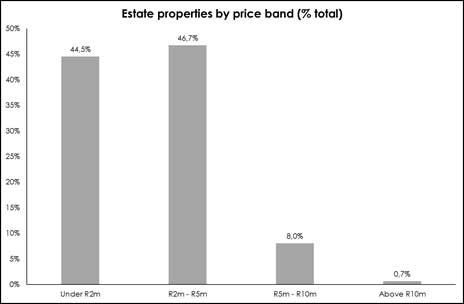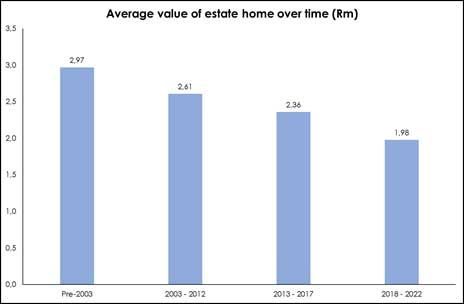While the South African housing market has been experiencing a shift towards sectional title homes, estates have also begun to rise in prominence in the wake of the pandemic, notes Dr Andrew Golding, chief executive of the Pam Golding Property group, with sales increasing from below 14% of total sales prior to Covid to around 17% by late-2021.

Dr Andrew Golding, chief executive of the Pam Golding Property group
“Currently, a desire for security and a shift towards a lock-up-and-go lifestyle, coupled with changes in the way we view retirement, is seeing an uptick in interest and demand for homes in secure estates.
“While estate living was initially seen as the preserve of the wealthy, they are becoming increasingly accessible to a broader cross-section of homebuyers as developers realise the potential of including sectional title and retirement homes in developments – thereby broadening the appeal of this convenient way of living.”

Source: Lightstone
Says Sandra Gordon, research analyst for Pam Golding Properties: “In 2010, an estimated 13.1% of all properties sold in South Africa were located in estates. While this drifted higher in subsequent years, by 2019 an estimated 13.7% of all homes sold were in estates. However, this changed abruptly in the wake of the pandemic, rising to 15.4% in 2020 and remaining elevated. In 2022, 16.4% of all homes sold were in estates.
“Given the growing preference for the security and convenience of living in an estate, this trend is likely to continue during the year ahead – particularly as estates become more energy- and water-efficient – thereby widening their appeal - and as the variety of homes available for sale become more diverse, again expanding their desirability and making estate homes more accessible to a wider audience.”
Lightstone recently noted that estates make up just 7% of South Africa’s more than seven million registered residential properties, but account for 17% of the total market value. They estimate that there are currently around 440,000 properties in more than 5,000 estates across South Africa.
Lightstone also points out that while residential sales fell during the first year of the pandemic (2020), the subsequent recovery in sales was driven by both sectional schemes and estates.

Source: Lightstone
Says Golding: “Statistics indicate that the Western Cape has become an increasingly important region in terms of estate sales, with the periods of growing estate sales in the region coinciding with the two periods of semigration – the first from 2013 to 2016 and the second from 2020 to date.
"This could reflect the preference of many buyers from Gauteng for estate living. As a result, the influx of older, more affluent homebuyers from the rest of the country into the Western Cape during the current wave of semigration could potentially result in a marked increase in estate sales."
Regional share of estate sales: (units sold)

Source: Lightstone
“Lightstone indicates that the number of estates in the Western Cape is the fastest growing, followed by Gauteng and then KwaZulu-Natal. Gauteng and the Western Cape account for 70% of all estate properties (units) sold in South Africa. In fact, the two provinces have consistently accounted for over 70% of all estate sales since 2010, however, the composition has shifted, with the Western Cape accounting for a larger share of total estate sales.
“While Gauteng is home to the largest number of homes in estates, the Western Cape has more high-value estate homes. In terms of actual sales, the shift in estate sales towards the Western Cape is the most noticeable in the R3m+ price band. In 2010, Gauteng sold twice as many >R3m estate homes than the Western Cape (1,060 vs 488) according to Lightstone.
"Sales in this price band increased steadily until 2015 when transactions concluded stabilised before rebounding once again in the wake of Covid. By 2022, Gauteng registered just 13.3% more >R3m estate homes than the Western Cape – highlighting the far stronger growth in the top end of the estate market in the Western Cape,” says Golding.

Source: Lightstone
Adds Gordon: “Lightstone notes that the estate market has ‘broadened’ during the past two decades. As a result, lower-value properties account for a sizeable portion of estate properties at the end of 2022. This was not the case when estates were first developed – when homes were almost exclusively larger, expensive freehold properties.
“Furthermore, Lightstone data reveals that at the end of 2022, nearly 190,000 estate properties were valued at less than R2m, while 196,000 were valued at between R2m and R5m (chart below). Almost 35,000 were valued at more than R5m.

Source: Lightstone
“To illustrate how the estate sector has become more diverse and affordable to a broader range of homebuyers, the graph below from Lightstone shows how the average estate property value has declined from nearly R3m prior to 2003 to just under R2m between 2018 and 2022.”

Source: Lightstone























































